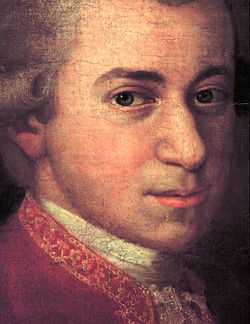Symphony, K. 19a (Mozart)
The Symphony in F major, K. Anh. 223/19a, was probably written by Wolfgang Amadeus Mozart in early 1765 in London.
The symphony is scored for two oboes, two horns and strings. In contemporary orchestras, it was also usual to include bassoons and harpsichord if they were available in the orchestra to reinforce the bass line and act as the continuo. The oboes are silent for the second movement. The duration is approximately 12-14 minutes.
The symphony consists of the following movements:
- Allegro assai, 4/4
- Andante, 2/4
- Presto, 3/8
The symphony was lost until a copy in the hand of Leopold Mozart was found in 1980. The title page stated it to be composed when Wolfgang was 9 years old, i.e. in 1765. However, since Leopold often advertised his son as being younger than his actual age, this date is questionable. Before the discovery, only incipits were known, from the archives of Breitkopf & Härtel and on the third page of the cover for the K. 19 symphony. (This cover had previously served as a cover for this symphony and a Symphony in C, K. 19b, still lost). The symphony had still not been found at the time of K6.
The symphony is influenced by Johann Christian Bach. Harold Schoenberg notes that the symphony "has no individuality" on account of Mozart's very young age at the time of its composition.[1]
References
- ↑ Schoenberg, New York Times July 8
External links
- Sinfonie in F K. 19a: Score and critical report (German) in the Neue Mozart-Ausgabe
- Symphony in F major, K.Anh.223/19a: Scores at the International Music Score Library Project
- MozartForum: K019a (K.Anh 223) Symphony in F Composed in Wolfgang's 9th Year--But Where and When? Article by Dennis Pajot
| ||||||||||||||||||||
| ||||||||||||||||||
